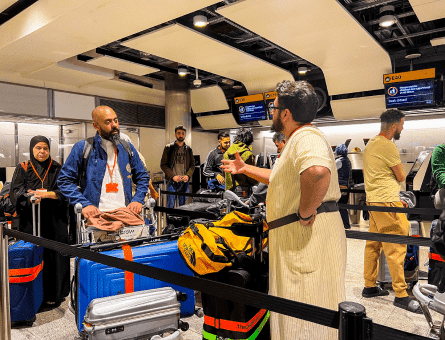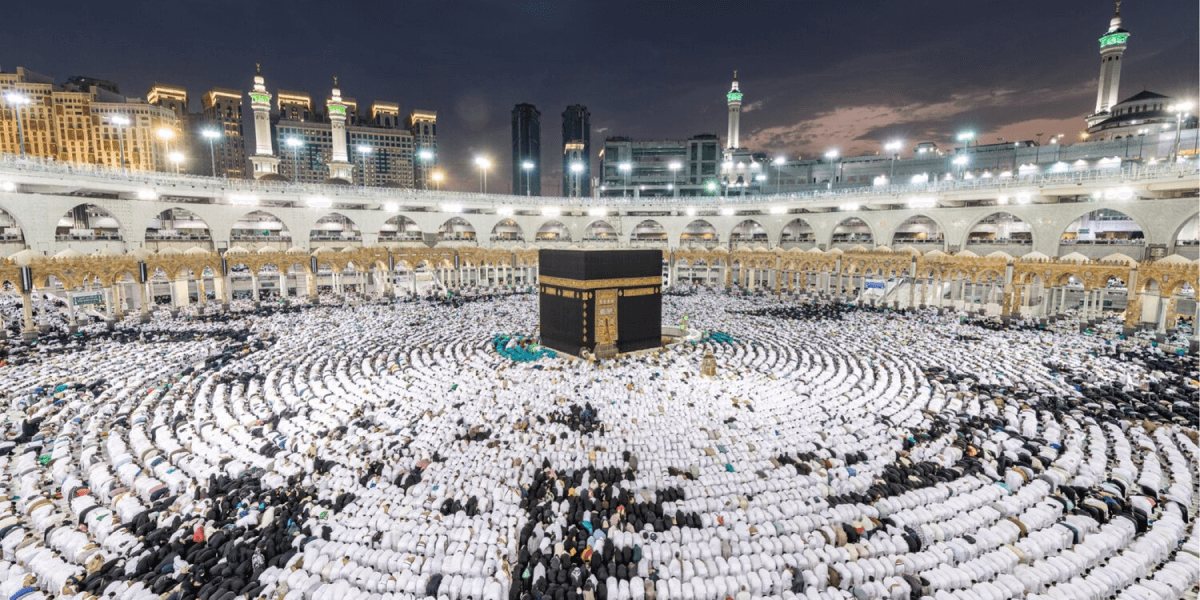When is Hajj Obligatory For Muslims? Conditions That Make Hajj Compulsory
Hajj, one of the Five Pillars of Islam, is a sacred journey that holds immense significance for Muslims around the world. It is a pilgrimage that millions embark upon to the holy city of Mecca, where they perform a series of religious rites and rituals. But when exactly does the obligation of Hajj fall upon the shoulders of a Muslim? Is it mandatory for all, regardless of age, gender, or circumstance?
In this comprehensive guide, we will explore the intricacies of when Hajj becomes obligatory and the various aspects surrounding this profound religious duty. From its historical origins to its cost and frequency, we’ll unravel the essential details that answer the question: When is Hajj Obligatory?
What is Hajj?
Hajj is regarded as one of the most significant religious duties for Muslims. It is a pilgrimage to the holy city of Mecca, located in present-day Saudi Arabia.
Hajj occurs annually during the month of Dhul-Hijjah, specifically from the 8th to the 12th day of the month, culminating in the celebration of Eid al-Adha, the Festival of Sacrifice.
The Hajj pilgrimage is deeply rooted in Islamic history and tradition, tracing its origins back to the Prophet Ibrahim (AS) (Abraham in Judeo-Christian tradition) and his family.
Muslims believe that Prophet Ibrahim (AS), along with his wife Hagar and their son Isma’il (Ishmael) (AS), played a central role in the establishment of the Kaaba, the cubic-shaped building at the heart of the Masjid al-Haram (the Grand Mosque) in Mecca.
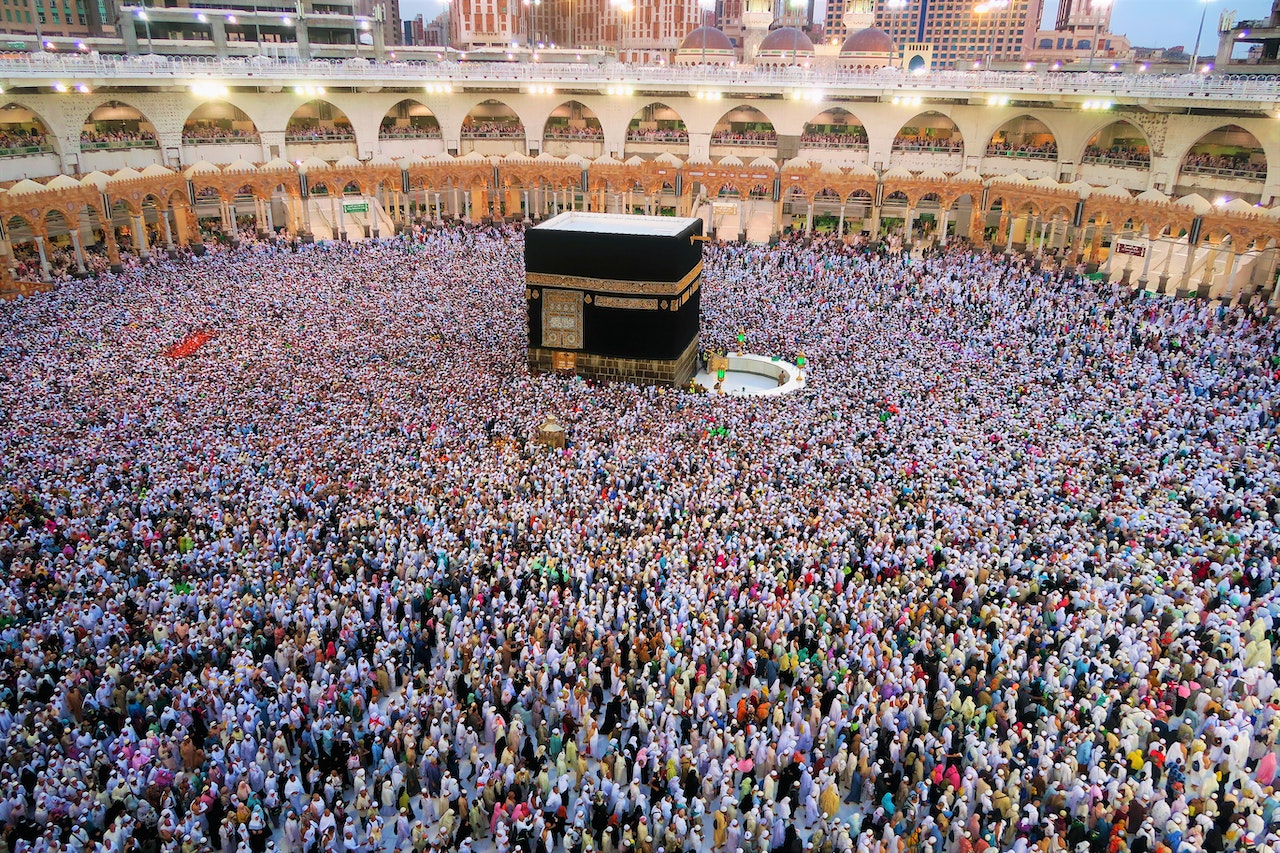
It is around this sacred structure that many of the Hajj rituals revolve.
The Hajj pilgrimage involves a series of religious rites and rituals that symbolise aspects of Prophet Ibrahim’s (AS) life and devotion to God. These rituals include:
- Ihram: Pilgrims wear white garments and refrain from specific activities.
- Tawaf: Circumambulate the Kaaba seven times.
- Sa’i: Walk between Safa and Marwah hills.
- Arafat: Stand in prayer at Arafat on the 9th day.
- Mina and Muzdalifah: Stoning of the Devil and overnight stay.
- Eid al-Adha: Sacrifice an animal in commemoration.
- Tawaf al-Ifadah: Another Tawaf and Sa’i if necessary.
- Tawaf al-Wida: Farewell Tawaf before leaving Mecca.
Hajj is not only a physical journey but also a spiritual one, aiming to purify the soul, seek forgiveness, and renew one’s commitment to Islam. It is a unique opportunity for Muslims to come together from all corners of the world, regardless of their social, economic, or ethnic backgrounds, and unite in faith and worship.
Is Hajj Mandatory In Islam?
Yes, Hajj is indeed mandatory in Islam for Muslims. It is one of the Five Pillars of Islam, representing a fundamental religious duty. However, this obligation applies under specific conditions, including financial and physical capability, maturity, and freedom to travel.
While not every Muslim is required to undertake Hajj every year, it is obligatory at least once in a lifetime for those who meet these criteria. This pilgrimage to the holy city of Mecca holds profound spiritual significance, emphasising unity, devotion, and the purification of the soul. It is a central aspect of a Muslim’s faith and a powerful demonstration of their commitment to Islam.
When Did Hajj Become Compulsory?
Hajj became compulsory in Islam during the 9th year of the Islamic calendar, specifically on the 9th day of the Islamic month of Dhul-Hijjah. This significant event in Islamic history is known as the Farewell Hajj (Hajjat al-Wida) and took place during the Prophet Muhammad’s (SAW) final pilgrimage.
During this pilgrimage, Prophet Muhammad (SAW) delivered his farewell sermon at Mount Arafat, where he clarified many aspects of Islamic teachings and emphasised the importance of various social and ethical principles.
It was during this sermon that he also declared the completion of the message of Islam and conveyed the message that Hajj had become an obligatory duty for Muslims who met the required conditions.
Prophet Muhammad’s (SAW) announcement during the Farewell Hajj solidified the obligation of Hajj in Islam. This event is a pivotal moment in the history of Islam and is commemorated by Muslims during the annual Hajj pilgrimage as a reminder of their faith and commitment to the teachings of the Prophet Muhammad (SAW).
Is Hajj Mandatory for Females?
Certainly, Hajj is an obligatory religious duty for eligible Muslim females. Women who meet the specified conditions, including financial capability, physical fitness, and maturity, are equally obligated to undertake the pilgrimage at least once in their lifetime.
Islam places a strong emphasis on gender equality in matters of faith and religious obligations, and this extends to the duty of Hajj, which is seen as a vital spiritual journey and a demonstration of devotion for both Muslim men and women.

Quranic Verses About Hajj Being Duty To All Muslims
The Quran contains several verses that emphasise the importance of Hajj as a religious duty for Muslims. One of the key verses is found in Surah Al-Imran (3:97):
“In it are clear signs [such as] the standing place of Abraham. And whoever enters it shall be safe. And [due] to Allah from the people is a pilgrimage to the House – for whoever is able to find thereto a way. But whoever disbelieves – then indeed, Allah is free from need of the worlds.”
This verse highlights that Hajj is a duty to Allah for those who have the means and ability to undertake the pilgrimage to the Kaaba in Mecca.
Another relevant verse is from Surah Al-Hajj (22:27):
“And proclaim to the people the Hajj [pilgrimage]; they will come to you on foot and on every lean camel; they will come from every distant pass “
This verse emphasises the universal nature of Hajj, as it calls upon people from all corners of the world to undertake the pilgrimage to Mecca.
These Quranic verses underscore the significance of Hajj as a religious obligation and emphasise the inclusivity of this sacred journey for Muslims of all backgrounds.
At What Age Is Hajj Fard?
There is no specific age mentioned in Islamic texts at which Hajj becomes obligatory (fard). Instead, the obligation is tied to certain conditions that individuals must meet.
However, individuals are encouraged to perform Hajj as soon as they meet the conditions and have the means to do so.
Delaying Hajj without a valid reason is discouraged in Islam, as it is considered a significant religious obligation.

Conditions that Make Hajj Compulsory For Every Muslim
So, when is Hajj obligatory for Muslims? The conditions that make Hajj compulsory (fard) for every eligible Muslim include:
1. Islam
Hajj is an Islamic pilgrimage, and therefore, it is mandatory only for those who have embraced Islam. Non-Muslims are not required to perform Hajj. The pilgrimage is considered one of the Five Pillars of Islam, making it a fundamental act of worship for Muslims.
2. Maturity
The obligation of Hajj begins when a person reaches the age of physical and mental maturity, which is commonly associated with the age of puberty. At this stage, individuals are deemed adults in Islamic jurisprudence, and they become responsible for their religious duties, including Hajj, if they meet the other conditions.
It’s important to note that there is no specific age mentioned in Islamic texts; rather, it is based on individual development.
3. Financial Capability
Financial capability is a crucial condition for Hajj. Pilgrims must have the financial means to undertake the journey to Mecca and cover the expenses of Hajj without causing financial hardship for themselves or their dependents.
This includes the cost of travel, accommodation, food, transportation within Saudi Arabia, and other associated expenses. It is essential that a person’s financial situation allows them to perform Hajj without incurring debt or neglecting their financial responsibilities.
4. Physical Capability
Physical capability is another significant condition. Hajj involves physically demanding activities, such as walking long distances, standing for extended periods, and participating in various rites, including the symbolic stoning of the Devil and the circumambulation of the Kaaba.
Pilgrims should be in good health and able to endure these physical challenges. Individuals with severe illnesses, disabilities, or conditions that prevent them from completing the rituals may be exempt from this obligation.
5. Freedom
Hajj is obligatory for those who are free to travel. This means that individuals who are enslaved or under physical restraint are not obligated to perform Hajj. This condition underscores the importance of free will and mobility in fulfilling religious duties.
6. Intention
The pilgrimage to Mecca should be undertaken with a sincere and devout intention to fulfill a religious obligation and seek Allah’s forgiveness. Intention (niyyah) plays a significant role in the validity and acceptance of Hajj.
These conditions ensure that Hajj is an obligation that is manageable, equitable, and spiritually meaningful for eligible Muslims. Meeting these criteria signifies that an individual is required to perform Hajj as a fundamental religious duty at least once in their lifetime, provided they have the means and capacity to do so.
How Often Is the Hajj Required?
Hajj is mandatory only once in a Muslim’s lifetime if they meet the above conditions. This means that a person who has performed Hajj once has fulfilled their mandatory obligation.
However, if someone has the means and opportunity, they can still perform Hajj after the obligatory Hajj. It is considered a voluntary act of worship in such cases.
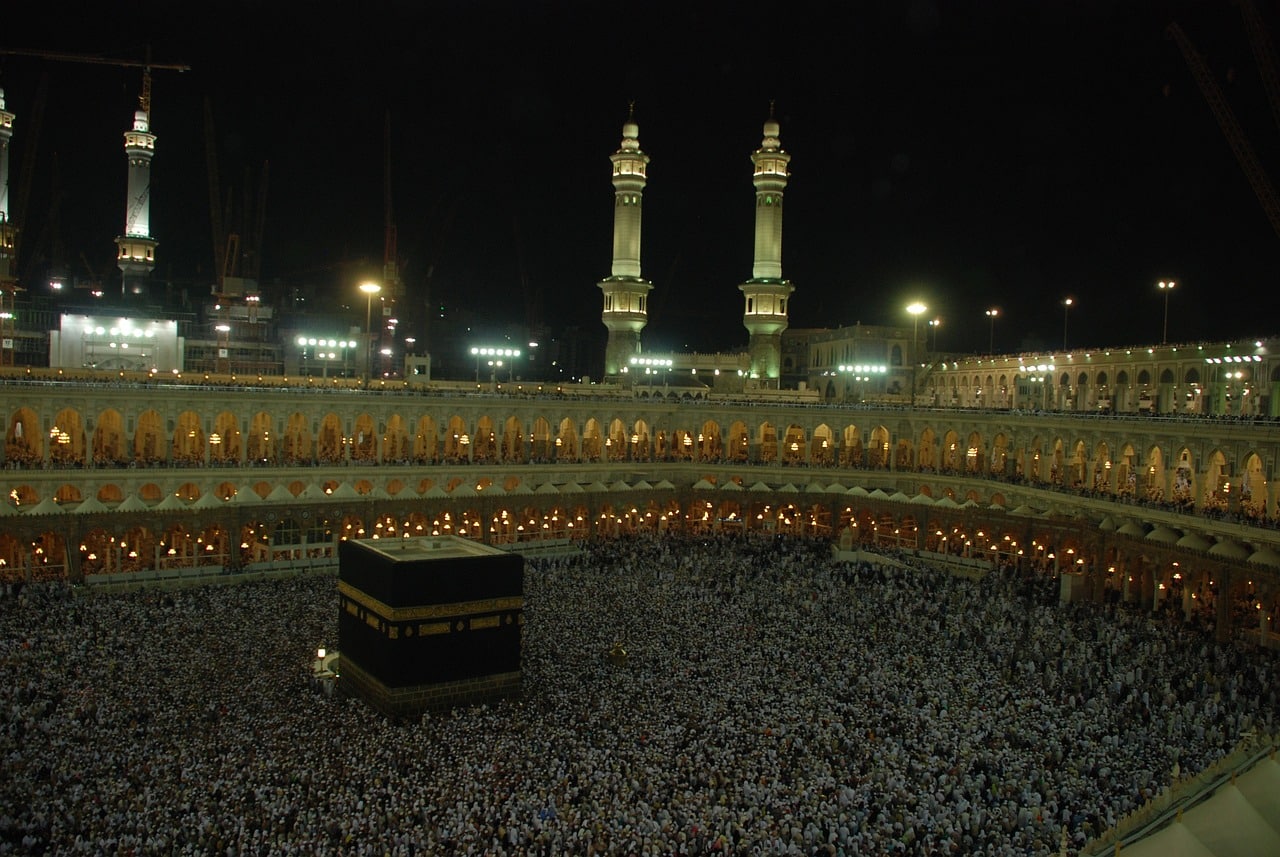
Is Hajj Compulsory After Umrah?
Hajj and Umrah are two distinct acts of worship in Islam, each with its own significance and requirements.
Hajj is obligatory for eligible Muslims under specific conditions, as previously discussed. Hajj takes place during a specific time frame each year, primarily during the Islamic lunar month of Dhul-Hijjah.
On the other hand, Umrah is a lesser pilgrimage. It can be performed at any time except during the days of Hajj (the Hajj season).
It’s essential to understand that while Hajj and Umrah share some common rituals, performing Umrah does not fulfill the obligation of Hajj.
If a person intends to fulfill their obligation for Hajj, they must do so during the Hajj season.
However, if someone has already performed Umrah and later decides to perform Hajj, the Umrah they previously completed (assuming it met all the required conditions) will still be valid and can count as part of the rituals for Hajj.
This combination of Umrah and Hajj is referred to as “Hajj al-Qiran” or “Hajj al-Tamattu‘.” In this case, the pilgrim would assume the state of Ihram for both Umrah and Hajj during the Hajj season, combining the rituals of both pilgrimages in a specific order.
Is Umrah Obligatory?
While it holds great spiritual significance and rewards, performing Umrah is not a mandatory religious duty like Hajj.
Muslims who have the means and opportunity to choose Umrah packages are encouraged to do so, as it is considered an act of devotion and a means of seeking Allah’s blessings and forgiveness. Umrah involves a set of rituals, including the Tawaf and Sa’i, among others.
While not obligatory, many Muslims perform Umrah during their lifetime to fulfill their spiritual aspirations and draw closer to Allah. Umrah is not obligatory in Islam, but it is a recommended act of worship that carries significant spiritual rewards for those who choose to undertake it.
How Much Does It Cost To Do Hajj?
The cost of performing Hajj can vary significantly based on various factors, including the country of residence, the type of Hajj package chosen, the time of booking, and the level of comfort and services desired by the pilgrim. Hajj expenses can be divided into several categories:
- Hajj Package: The primary cost involves the Hajj package itself, which typically includes accommodation, transportation, food, and other services. Prices can vary widely based on the package’s quality and duration. Economy packages are generally more affordable, while VIP or luxury packages come at a higher cost.
- Airfare: The cost of airfare to and from the departure point to Jeddah or Medina, Saudi Arabia, is a significant expense. Prices can fluctuate depending on the airline, class of travel, and time of booking.
- Visa Fees: Pilgrims are required to obtain a Hajj visa, which often comes with associated fees. The visa fees can differ for different countries.
- Travel and Miscellaneous Expenses: This category includes expenses for local transportation, shopping, gifts, and other miscellaneous costs.
- Qurbani (Sacrifice): Pilgrims who choose to perform the Qurbani (ritual sacrifice) as part of their Hajj obligations will incur additional expenses for purchasing an animal and its slaughter.
- Pre-Hajj Preparation: Costs related to vaccinations, travel insurance, and necessary items for the journey.
- Additional Services: Pilgrims may opt for additional services, such as guided tours, special accommodations, and transportation upgrades, which can increase the overall cost.
The total cost of Hajj can range from a few thousand dollars to several thousand dollars or more, depending on the choices made by the pilgrim.
It’s essential for those planning to perform Hajj to budget carefully and consider their financial situation to ensure that they can undertake the pilgrimage without causing financial hardship for themselves or their dependents.
Additionally, it’s advisable to consult with a reputable Hajj travel agency or organisation for detailed information on package prices and inclusions, as well as to verify the latest requirements and costs associated with Hajj.
The expenses associated with Hajj can change from year to year, so it’s important to stay updated.

Why Is Hajj So Expensive?
Hajj can be relatively expensive for several reasons:
- High Demand: Hajj is a massive annual event, with millions of pilgrims from around the world converging on Mecca. The high demand for accommodations, transportation, and services during the Hajj season can drive up prices significantly.
- Government Regulations: The Saudi government imposes various regulations and requirements for Hajj, which can lead to additional costs. These regulations include specific accommodation standards, transportation arrangements, and health and safety measures.
- Infrastructure Costs: The Saudi government invests heavily in infrastructure to accommodate the millions of pilgrims who come for Hajj. The maintenance and expansion of facilities, such as the Grand Mosque in Mecca and the infrastructure in Mina and Arafat, require significant financial resources.
- Services and Amenities: Many pilgrims prefer more comfortable accommodations and services during their Hajj journey, leading to higher costs. VIP or luxury packages that offer additional amenities come with a premium price tag.
- Travel Expenses: The cost of airfare, especially during the peak Hajj season, can be substantial. Pilgrims from countries farther from Saudi Arabia may incur higher travel expenses. Visa fees, administrative charges, and other associated fees can contribute to the overall cost of Hajj.
- Sacrifice (Qurbani): Pilgrims who choose to perform the Qurbani (ritual sacrifice) as part of their Hajj obligations will incur additional expenses for purchasing an animal and its slaughter.
- Currency Exchange Rates: Exchange rates can affect the cost for pilgrims from countries with weaker currencies, as they may need to exchange their currency for Saudi Riyals at less favorable rates.
- Market Forces: Like any other industry, the cost of services during Hajj is also subject to market forces and competition. Prices can vary among service providers, and those who offer higher-quality services often charge more.
It’s important to note that while Hajj can be expensive, many Muslims save for years to fulfill this important religious obligation.
Efforts are made to provide more affordable options for pilgrims, and some countries also have government subsidies or assistance programs to help lower-income individuals perform Hajj.
Ultimately, the cost of Hajj varies depending on individual choices, preferences, and circumstances.
Do I Have To Perform Hajj Each Year?
No, you do not have to perform Hajj each year. In Islam, Hajj is obligatory (fard) only once in a Muslim’s lifetime, provided they meet the necessary conditions. There is no requirement to perform Hajj annually or repeatedly.
However, if someone chooses to perform Hajj more than once and has the means and opportunity to do so, it is considered a voluntary act of worship and is highly meritorious.
Many Muslims perform Hajj multiple times in their lifetime as a means of seeking greater spiritual rewards and blessings.
Can a 65-Year-Old Go To Hajj?
Yes, a 65-year-old individual can go on Hajj, provided they meet the necessary conditions for undertaking the pilgrimage. Age alone is not a barrier to performing Hajj.
Many older individuals successfully perform Hajj, and they may find the experience deeply spiritually fulfilling.
It’s important for older pilgrims to consult with medical professionals, prepare adequately, and take precautions to ensure a safe and comfortable journey.
Additionally, they may opt for less physically demanding rituals or consider alternative arrangements to accommodate their needs.
Can a Woman Cover Her Face In Hajj?
When it comes to Hajj and Umrah, it’s important to note that wearing a niqab is not a requirement. In fact, it is forbidden for the niqab to touch the face during these sacred pilgrimages.
To address the comfort of those who are accustomed to wearing the niqab, some women choose to place a cloth over a cap, which effectively veils them from a distance without the niqab coming into contact with their face.
This approach allows them to maintain their modesty while adhering to the regulations.
However, it’s essential to emphasise that there is no obligatory requirement to wear any cap during Hajj and Umrah. Your level of comfort and adherence to your beliefs should guide your choice in this matter.
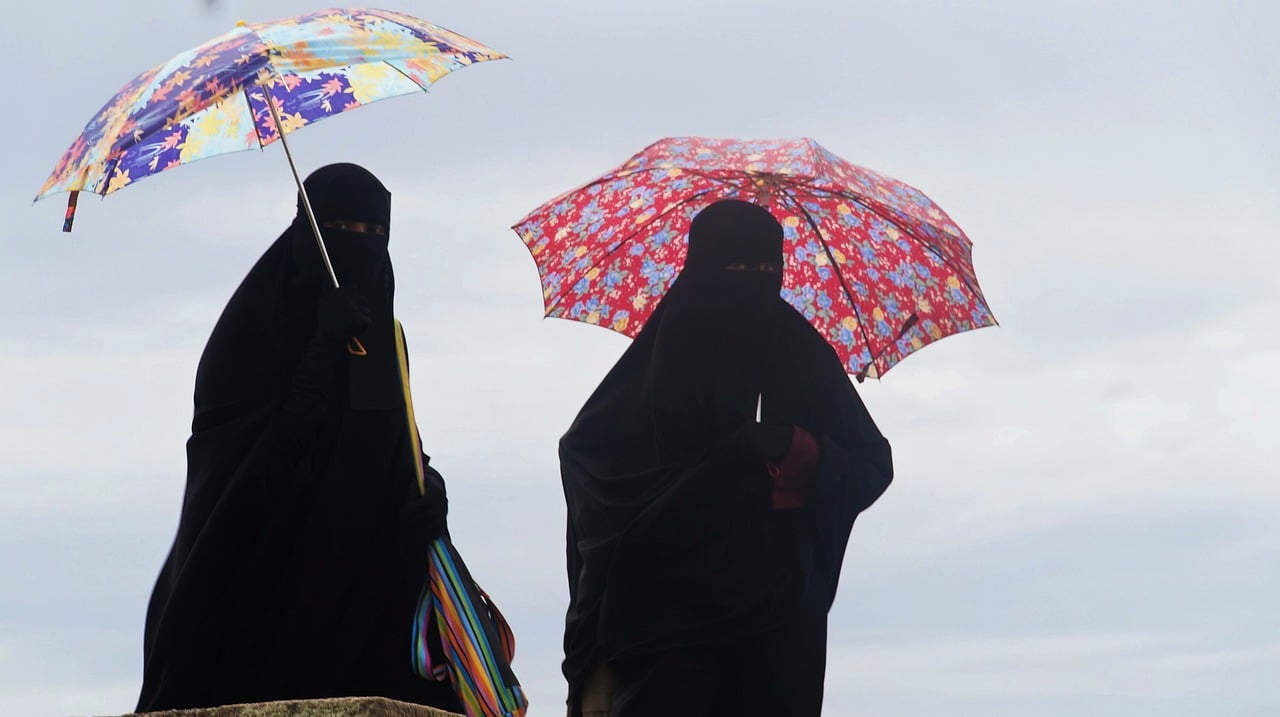
Can a Women Go To Hajj Without Her Mahram Or Husband?
Traditionally, Islamic law has required women to be accompanied by a mahram (an unmarriageable kin) when traveling for Hajj or Umrah as a measure to ensure their safety and well-being. A mahram is typically a male relative with whom marriage is prohibited, such as a father, brother, husband, or son.
However, recognising that circumstances vary and some women may not have a mahram but are physically and financially capable of performing the pilgrimage, the Saudi Ministry of Hajj and Umrah has made an exception.
Women who do not have a husband or other mahrams are allowed to perform Hajj or Umrah as long as they travel with a group of reliable and trusted companions and maintain appropriate distance from non-mahram men during the journey.
This change in policy is aimed at accommodating the needs of women who wish to fulfill their religious duty but do not have a mahram available to accompany them.
It is essential for such women to make proper travel arrangements, ensuring they are in the company of trustworthy individuals to ensure their safety and adherence to Islamic guidelines during the pilgrimage.
Summary – When is Hajj Obligatory?
In conclusion, the obligation of Hajj in Islam is a sacred and significant aspect of the faith. It is one of the Five Pillars of Islam and holds deep spiritual and religious importance for Muslims worldwide.
We’ve learned that Hajj is mandatory for eligible Muslims, subject to specific conditions, including financial capability, physical capability, and sincere intention.
Understanding the conditions, historical context and guidelines associated with Hajj is crucial for those who aspire to fulfill this religious duty.
While it is obligatory only once in a lifetime for eligible Muslims, it remains a lifelong aspiration for many, symbolising unity, devotion, and the pursuit of Allah’s blessings and forgiveness
Through His Names
New course with
Ustadh Shabbir Hassan













